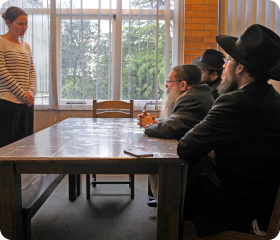Rate My Beit Din exists to evaluate and improve Jewish divorce in the rabbinic court (beit din) system. Courts are rated via user and professional reviews and are offered ways to improve user’s experience.
383
10
38
4

5 / 5
Average rating
5 / 5
Average rating
5 / 5
Average rating
1 / 5
Average rating
1 / 5
Average rating
1 / 5
Average rating

Although this is not yet the universally accepted practice in Jewish divorce, there are significant benefits to addressing the Get early on, particularly in order to avoid concerns of the get being used as a tool to extort concessions in a divorce. Please reach out to a local resource for guidance in determining a strategy informed by your particular case and needs.
Before the ceremony the dayanim will confirm details with the couple and a sofer (scribe) will write the Get with a quill and ink. The beit din might allow the couple to take a break while the Get is being written. The Get ceremony is a standard ritual though there can be variations (like if the Get is given through a shaliach or messenger). One should allow for an hour for the ceremony (not including the writing of Get).
